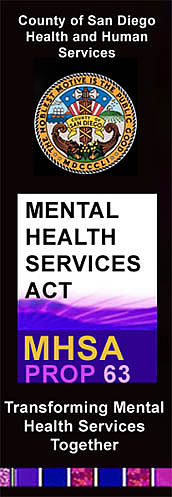MENTAL HEALTH SERVICES ACT • MHSA • PROP 63 |
|
What is a mental health disorder
...The Surgeon General's 1999 report on mental health states that mental health disorders are "health conditions that are characterized by alterations in thinking, mood, or behavior (or some combination thereof) associated with distress and/or impaired functioning." A mental health disorder is a disease that causes mild to severe disturbances in thinking, perception and behavior. If these disturbances significantly impair a person’s ability to cope with life’s ordinary demands and routines, then he or she should immediately seek proper treatment with a mental health professional. With the proper care and treatment, a person can recover and resume normal activities. ...If your best friend told you she had breast cancer, how would you react? If you are like most people, you would express sympathy and concern, offer your support and reassurance, and feel confident that your friend’s condition would improve with treatment. Now, if that same friend told you she had a mental illness and she did not know what to do, what would you do? ...Our society has a long history of alienating people with mental health problems, placing them in institutions or maintaining them in social isolation due to prejudice. Mental health conditions affect the person’s health. People may be less willing to offer support and empathy if someone is suffering from a mental health illness rather than a physical health problem. Mental health disorders or illnesses are no different from physical illnesses and the emotional and psychological aspects of mental disorders make supportive friends and family even more important to a person’s recovery. People with mental disorders can recover or manage their conditions and lead happy, healthy, productive lives. ..People with mental health disorders often exhibit types of behaviors, such as sadness and irritability. In more severe cases, they may also suffer from hallucinations and total withdrawal. This can result in people with mental health disorder experiencing hostility and discrimination instead of receiving compassion and acceptance from others. People generally respond negatively when confronted with a person's mental health disorder due to poor understanding of the issue and being unable to relate to the experiences of those who are affected. It can seem more difficult to empathize with or accept a person with a mental health disorder and generate misunderstanding, prejudice, confusion and fear towards them. --> Unveiling the Barriers of the Stigma and its Harmful Effects
|
|
Transforming Mental Health Services Together |
|
Salud+HealthInfo is for information and educational purposes only. You should not rely on this information as a substitute for personal medical attention, diagnosis or hands-on treatment. If you are concerned abut your health or that of a child, please consult your family's physician or health provider immediately and do not try to diagnose yourself. Salud+Health Info is published and distributed free of charge by Info Option Network (ION) Publishing Company. Copyright © 2001-2008 Info Option Network |
|
Bienvenido a la primer revista dedicada al cuidado de la salud
 info
info
The first, the best & the only English & Spanish Magazine in San Diego, California
|
| |
| |
|
| .....Mental Health Services Act .....Prop 63 |
| Overcoming the Barriers in Mental Health |
What is a Mental Health disorder |
| Unveiling the Barriers of the Stigma and its Harmful Effects |
| Some of the harmfull effects of stigma |
| Stigma and Discrimination Ends the Hope |
| Stigma Can be Reduced |
| Coping with the stress of natural disaster |
| Alzheimer's |
| Parkinson's Disease |


